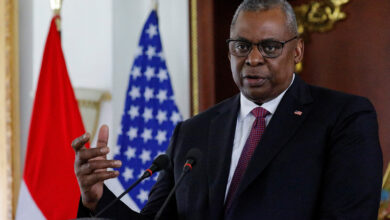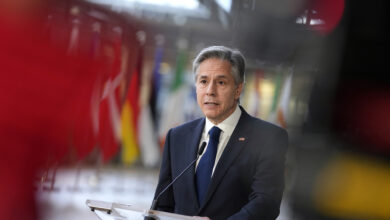On 15 April, 2004, 2nd Lieutenant Ilario Pantano, a 32-year-old US marine, stopped and detained two Iraqis driving on a dirt road south of Baghdad. He instructed the two men, Hamaady Kareem and Tahah Ahmed Hanjil, to search their own car for weapons. None were found.
Then, Pantano opened fire.
Standing ten feet away, he unloaded a magazine of his M16A4 assault rifle into the two men. He stopped to reload, and emptied another magazine at them, firing 60 rounds in total. He then placed a sign next to the bullet-riddled corpses with the marine slogan, "No better friend, no worse enemy."
The military later charged Pantano with premeditated murder but dropped the case on the grounds that the evidence was insufficient, even though Pantano himself didn't dispute shooting the two unarmed men at point-blank range.
Fast forward to today and Pantano may be on the verge of winning a seat in Congress. With the backing of the Tea Party, he is running on the Republican ticket in a tight race against Democratic incumbent, Rep. Mike McIntyre, in North Carolina's 7th Congressional District. Viewed as a potential star on the right-wing of the national GOP, Pantano has been endorsed by former Alaska governor and Republican vice presidential nominee Sarah Palin, and former New York Mayor Rudy Giuliani. If Pantano wins, he would be the first Republican to hold the seat in 139 years.
Even more stunning than his easy ascension from accused murderer to Republican congressional candidate is that his brutal killings in Iraq have hardly been mentioned in the mainstream media and that his opponent, McIntyre, has refused to bring up the issue on the campaign trail. When asked by Salon.com if he was surprised that his critics have largely ignored the Iraq incident, Panatano was defiant. "If they want to question my war effort, if they think that's prudent, they can go ahead… I've served my country proudly."
Pantano is part of a surge of hardline, conservative Republicans looking to take back Congress in this week's midterm elections. By most estimates, the Republican Party is expected to win back control of the House of Representatives, gaining somewhere in the range of 50 seats. Republicans are also expected to pick up a number of seats in the Senate but it remains to be seen whether they will be able to wrest control of the chamber from the Democrats.
Like in Pantano's case, candidates from both parties appear to have decided that talking about the two wars that have dominated American foreign policy for nearly a decade is not in their best interest. As the vitriol and mud-slinging escalated in the final weeks of campaigning, the only thing Democrats and Republicans appear to agree on is that debate about the wars in Iraq and Afghanistan is not an election issue. The same is true for President Obama as he crisscrosses the country stumping for the Democrats.
Meanwhile, a compliant mainstream media in the United States only covers what the two main political parties in power deem newsworthy. So if war is not an issue on the campaign trail, it's not an issue in the news. As the media works itself into a frenzy of election coverage, the subject of Afghanistan or Iraq simply does not come up.
According to the Pew Research Center’s Project for Excellence in Journalism, news about the midterm elections took up 38 percent of total air-time and print-space for the week of 18-24 October. The war in Afghanistan was just three percent. The release of nearly 400,000 Iraq war logs by WikiLeaks, the largest intelligence leak in US history, was two percent. To put this in perspective, the story of NPR’s firing of analyst Juan Williams was deemed more newsworthy, garnering five percent of total coverage.
This in a year that has been the deadliest for US forces in Afghanistan. In the wake of President Obama's decision to escalate the war and send in an additional 30,000 troops, more than 400 US service members have been killed in 2010 alone. The toll on Afghans is, of course, much higher but the prospect of any real coverage of civilians deaths in the US media is grimly laughable.
What is dominating midterm election campaigns is the issue of jobs and the economy. Talk about unemployment, the budget deficit and the Wall Street bailout is all over the news. Yet the connection with the astronomical cost of America's foreign policy adventures in Afghanistan, Iraq, Pakistan and elsewhere is hardly ever made.
The Nobel Prize-winning economist Joseph Stiglitz estimates that the cost of the wars in Iraq and Afghanistan will reach a whopping four to six trillion dollars. "When we went to war in Iraq and Afghanistan, we already had a deficit. So these wars were the first wars in America’s history financed totally on the credit card," Stiglitz said in an interview on the independent radio and television program Democracy Now!. "Spending money in Afghanistan, paying money for contractors, are not the way to energize our economy and make our economy strong, competitive for the long run." Nevertheless, the majority of both Democrats and Republicans in Congress continue to blithely fund America's military campaigns abroad.
On 2 November, millions of Americans across the United States will head to the polls to cast their vote. Presumably, war will not be foremost on their minds.
Sharif Abdel Kouddous is a producer for the independent TV/radio show Democracy Now!




